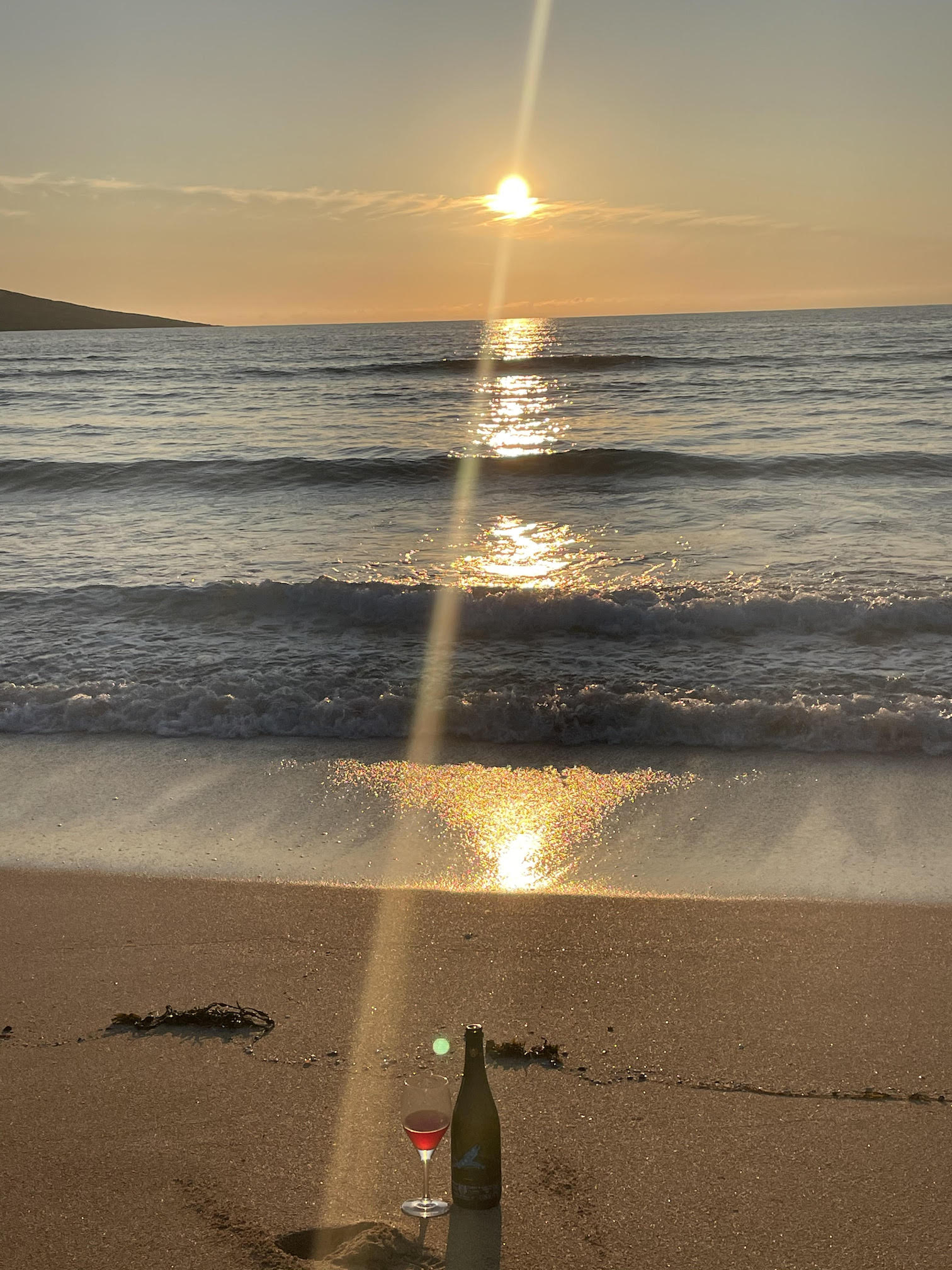One of the things that I like doing on holiday is to bring a bottle of wine down to the beach when the sun is setting, half fill a glass and stand on the sand where it slopes down to the water. The aforementioned beach faces west, describes a graceful arc of pink-tinged shell sand, is flanked by hills on three sides and open to the Atlantic on the other. As the sun descends towards the ocean, a beam will glance across the blue-grey expanse like a road of fire which strikes the sand at the point just beyond where it kisses the surf. I position my glass on the spot whereupon the liquid momentarily catches the light and seems to glow.
It is indeed a conceit bringing the wine into proximity with natural beauty. But it’s one I enjoy. I choose wines that taste pure, natural, and delicious because they reflect the sense of where I am at that moment. Critical faculties all but abandoned. Sans ego, not judging the wine, just feeling it, enjoying it as part of the view, so to speak. The wine amplifies the pleasure because it seems like an additional colour to nature’s glorious palette.
Taking in a dramatic sunset on the edge of the world like this (so it seems) is spiritually nourishing. Drinking a glass of natural wine further stimulates one’s appreciation of beauty. Would a conventional wine do as well? Probably not. Any trace of artifice would not help, because although one’s critical faculties may be briefly suspended, the tongue can still taste.
The wine amplifies the pleasure because it seems like an additional colour to nature’s glorious palette.
When I speak of natural wine, as often as not, I am referring to the concept as well as the sensation of being liberated. Those who relish natty wine speak about a particular wine as being free. As in being of itself, free from artifice, make-up and obvious manipulation. Free is part of the nebulous nomenclature that we may apply to certain low-intervention wines, one word in a vocabulary of abstract qualities and rough concepts. Seamlessness, purity, fluidity, harmony are other aesthetic descriptors. What we are saying is that certain wines possess a kind of flawed beauty that mirrors nature. Free or liberated, also, from the responsibility of being made as a commercial product and only being appreciated as such, free from needing to be subjected to normative critical/evaluative standards. And we are also liberated in that we do not need to invoke mundane language to describe our experiences. Later on, as we sift through memories, we will, of course, summon highly imperfect words and sentences to try to create a structure for our emotions.
We all have our trigger words to describe tasting wine based on an amalgam of lived and cultural experience. Delving into the heart of something so intensely personal may leave us torn between the desire to frame an experience in language and using words to render the feeling into thought (and thus be communicable) and accepting beauty for what it is. The sensation you wish to convey is that this wine is alive, because nature is alive and you are alive, and the words, whichever you choose (and choose carefully) are memories which have been reshaped to capture a tiny portion of the essence of the emotions you were feeling at the time.
An intensely realised emotion is a blessing. And, in a way, blessed is what I felt. At the intersection of earth, ocean, and sky, the sun and the waves, the light gently fading, a sense of impermanence (combined with the desire to hold on to this magic moment for as long as possible), the journey of that single ray of sun (so it seemed in my fancy) to illumine the wine in the glass for a fraction of moment, intangible meaning in a world of whirling chaos. All coming together in an instant of sublime satisfaction. And joy. The wine is the witness, the participant, the conduit, for as I put it in my mouth and roll the liquid around, I hold the moment of experience in flavour and texture. And then, like the light of day itself, it vanishes, with only the impression of something felt remaining.


